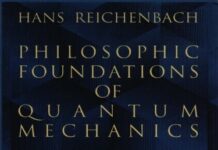
Ebook Info
- Published: 2013
- Number of pages: 128 pages
- Format: PDF
- File Size: 7.52 MB
- Authors: Hans Reichenbach
Description
Hans Reichenbach (1891-1953) was a leading philosopher of science, teacher and proponent of logical empiricism. Reichenbach is best known for founding the Berlin Circle, who were a group that maintained logical empiricist views about philosophy.From Copernicus to Einstein is one of the most highly regarded popular accounts of Einstein’s theory of relativity. This book traces the consequences of Copernican astronomy and the advances in the study of light and electricity, then precisely describes the development of the Special and General Theories of Relativity.
User’s Reviews
Reviews from Amazon users which were colected at the time this book was published on the website:
⭐Read this book when I was 17 years old…loved it…based my senior year high school project on the ether wind theory of light propagation. It was my Dad’s book and it was lost in time. When I saw it on Amazon, just had to have it again…read it and loved it all over again. Tiny bit dated because of all the new discoveries, but all the data and theories are still solidly based on Einstein’s writings.
⭐good book
⭐Incredibly slow delivery at a high price.
⭐It should be known beforehand that this work by Reichenbach does not mark an exhaustive or even in-depth discussion of the historical journey from Copernicus’ world to Einstein’s. What it does contain is the minimum historical arc with some really interesting insights, replete with philosophical exegesis of the pertinent theories. All of this is done with minimal technical verbiage, so far as the physics is concerned. All in all, I found the general discussion to be enjoyable and well worth reading. Some of the most interesting ideas worth reflecting upon are so simplistically written that I thought them to be both beautiful and conceptually plumbing. I recommend this book to high-schoolers, undergrads, grads, and laypeople alike. I wouldn’t call it a must-read for those devoting great energy to the study of history and philosophy of science, but it is incredibly accessible, which should be taken into consideration. (It was written in a time when there was not yet a proper philosophy of physics community, and so it was written for as broad an audience as possible, in particular, the general philosophical community, with some appeal to scientists.) For those spending great energy and time studying history and philosophy of physics, I would say that this is very nearly a must-read, so let the deciding factor be the short-ness of the text. Being that it is a little more than 100 pages, and given renown of the author, I would say that it is one of those texts that one needs to find time to read.
⭐It should be known beforehand that this work by Reichenbach does not mark an exhaustive or even in-depth discussion of the historical journey from Copernicus’ world to Einstein’s. What it does contain is the minimum historical arc with some really interesting insights, replete with philosophical exegesis of the pertinent theories. All of this is done with minimal technical verbiage, so far as the physics is concerned. All in all, I found the general discussion to be enjoyable and well worth reading. Some of the most interesting ideas worth reflecting upon are so simplistically written that I thought them to be both beautiful and conceptually plumbing. I recommend this book to high-schoolers, undergrads, grads, and laypeople alike. I wouldn’t call it a must-read for those devoting great energy to the study of history and philosophy of science, but it is incredibly accessible, which should be taken into consideration. (It was written in a time when there was not yet a proper philosophy of physics community, and so it was written for as broad an audience as possible, in particular, the general philosophical community, with some appeal to scientists.) For those spending great energy and time studying history and philosophy of physics, I would say that this is very nearly a must-read, so let the deciding factor be the short-ness of the text. Being that it is a little more than 100 pages, and given renown of the author, I would say that it is one of those texts that one needs to find time to read.
⭐This is a not so easy understandable popular scientific work about the theory of relativity.It is a little bit out of date, but it should be read for his examples.4 dimensions”Three numbers are needed to determine a point in space. Suppose a lamp hangs in the room. How can we determine its place? We measure its distance from the floor, from the back-wall and from the side-wall; these three figures determine its position in space. … If we want to determine not a point in space but an event, we require another figure, namely, the statement of time. Suppose we switch on the light for a second and produce a flash of light; this is an event. It is completely determined if we know the three numbers defining the position of the lamp and, in addition, the fourth number defining the time of the light flash. Insofar as there are four figures, space and time together are called a four-dimensional manifoldness. This is the whole secret.”The author stresses also the importance of Riemann and the influence of Michelson on Einstein.But, as an introduction I prefer Bertrand Russell’s ‘ABC of Relativity’.
⭐I was very much impressed by this little book. From it I first learned about Mach’s Principle, and how it followed right from the concept that motion is relative. The analysis of Newton’s pail experiment is astonishing. It is just a combination of powerful ideas, with no equations. Nowadays, when I happen to teach General Relativity, I begin with this analysis by Reichenbach, also because it is one of its conclusions that Newton’s gravity theory is inconsistent with motion being relative. At least you have to accept that a moving mass attracts differently than one at rest. This is already extra-Newtonian. Reichenbach, a member of the famous Vienna Circle was a very sharp-minded fellow, and a very clear one too. This book is a must.
Keywords
Free Download From Copernicus to Einstein in PDF format
From Copernicus to Einstein PDF Free Download
Download From Copernicus to Einstein 2013 PDF Free
From Copernicus to Einstein 2013 PDF Free Download
Download From Copernicus to Einstein PDF
Free Download Ebook From Copernicus to Einstein

